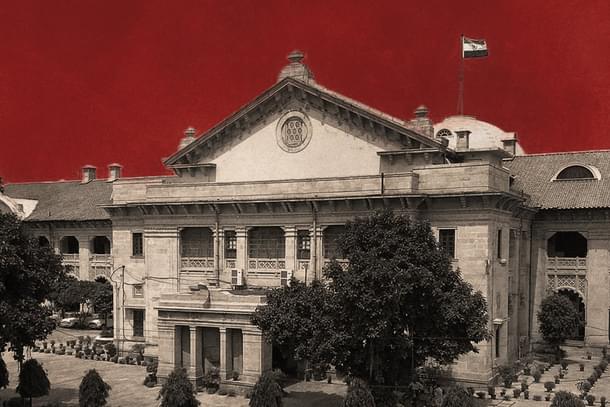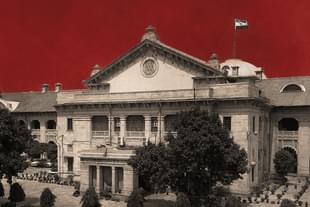Uttar Pradesh
Allahabad HC Loses 'Strength', Appears Too 'Distant' To Western UP
Nishtha Anushree
Feb 28, 2025, 01:04 PM | Updated Mar 03, 2025, 09:34 AM IST
Save & read from anywhere!
Bookmark stories for easy access on any device or the Swarajya app.


The shortcomings of the judicial system in Uttar Pradesh (UP) came out in the last few days with the protests of lawyers at the Allahabad High Court (HC) and its Lucknow Bench, as well as through the voices raised by the legislators in the Assembly.
The lawyers' protests started on 21 February over the decreasing strength of judges in the Allahabad HC, which has now come to less than half of the sanctioned strength of 160.
The lawyers, who abandoned judicial work to mark their protest, have however, returned to the work for now, but are ready to wage a protest again, if their demands remain unfulfilled.
The protest was also against the Advocates (Amendment) Bill 2025, which aims to amend the 1961 Act and whose draft was made public earlier this month for wider consultation. Lawyers believe it would restrict their autonomy.
In a meeting on 24 February, it was assured to the lawyers that their demand for changes in the Advocates (Amendment) Bill 2025 will be accepted, while no assurance was given for filling the vacancies of judges.
Thus, the protest continued on 25 February as well and spread to the Lucknow Bench of the Allahabad HC and its subordinate courts. There too, lawyers abstained from judicial work but have now returned to their tables.
Another development happened in the UP Legislative Assembly earlier this week, where several members of the Legislative Assembly (MLA) across party lines demanded a Bench of the Allahabad HC in western UP, citing long distance to Prayagraj and the inconvenience caused by it.
Among the MLAs making this demand were Samajwadi Party (SP) MLAs Umar Ali Khan and Atul Pradhan, Rashtriya Lok Dal (RLD) MLA Persann Chaudhary and Bharatiya Janata Party (BJP) MLAs Dhirendra Singh, Dr Manju Shiwach and Nand Kishor Gurjar.
Let's understand these issues in detail
The Judges Strength
The Allahabad HC is currently working at a strength of 78 judges, of which 23 are posted at the Lucknow Bench, while the remaining 55 work at Prayagraj, as against the sanctioned strength of 160.
The lawyers at the Allahabad HC told Swarajya, that the court always had at least 50 judges less than the sanctioned strength, but the situation has worsened in the last few years with the number declining to below half the strength.
This happened because very few new appointments were made to bring new judges, while the existing judges continued to retire on completing their tenures.
In 2025, a single judge, Justice Praveen Kumar Giri, has been appointed yet, while in 2024, no new judge was appointed, instead, only 14 additional judges were promoted as permanent ones in two batches of five and nine.
Now, there are no more additional judges left to be promoted further and at least half a dozen judges are set to retire in 2025. This means that without new appointments, the strength will continue to decline further.
The High Court judges are appointed by the President of India after consultation with the Chief Justice of India (CJI) and on the recommendation of the High Court's Chief Justice.
A collegium system is followed where the High Court's Chief Justice recommends names after consulting with two senior-most judges of the HC and the CJI approves it after consulting with two senior-most judges of the Supreme Court (SC).
The reason for the delay in the appointment of judges is only speculated upon. The lawyers are unsure whether it is because of the lackadaisical approach of the HC or the SC or because of alleged interference by the government by not approving the names recommended by the judiciary.
Nonetheless, the decreasing strength of the Allahabad HC judges has made the judicial system inefficient, leaving no other option for the lawyers, except raising the issue through protests.
The Impact Of Decreased 'Bench Strength'
The number of pending cases in the Allahabad HC has been increasing since 2018, but the rate of increase has gone up further since 2020, as advocate Vivek Pal told Swarajya, "The situation has worsened since Covid."
From 9 lakh pending cases in January 2018, the number of pending cases has increased to 11.5 lakh in January 2025. This means, on an average, 35,000 pending cases were added every year in the last seven years.
"Fresh cases are listed at least three to four months after filing. It becomes very difficult for us to answer the clients. The listing of older cases (for hearing) is even more difficult. Even after getting a date, the hearing gets postponed," Vivek Pal said explaining the impact of shortage of judges at the bench.
This created difficulty not only for lawyers or petitioners, but also for judges themselves. "Disposal of cases becomes the biggest challenge. A single judge has to handle five types of cases, creating a burden on them," another advocate, Vinay Rai told Swarajya.
While the efficiency of judges is reduced due to the handling of different types of cases at the same time, the disposal rate is reduced as well. "Only 25 to 30 cases are disposed in a single day. This number should be 100," Rai added.
The delayed judicial process is also affecting the lawyers economically. "Our fees have reduced drastically due to the low disposal rate. People fear hiring lawyers due to the slow process, so we have to reduce our fees to get the clients," Rai explained.
Similarly, Vivek Pal explains, "When the client does not get his work done, why would he pay fees. Clients from villages come and give only a token amount and promise to give the remaining fee on completion of work, but when there are no hearings, what fees will they give?"
Other issues
While the lawyers grapple with the difficulties caused by delayed judicial processes, they got another thing to worry about: the Advocates (Amendment) Bill 2025, which they claim 'increases their accountability but decreases independence'.
"Earlier, the Bar Council was authorised to listen to cases related to lawyers, but now a government-appointed individual will do that, tilting scales against lawyers. The draft tried to restrict advocates," advocate Vivek Pal said.
Vinay Rai explained, "Advocates don't get any payment from the government, but still the draft tries to restrict advocates. If you (government) don't provide any facility for us, then how can you attack our independence?"
However, after the protest, it was conveyed to the lawyers that the government has taken back the Bill for re-consultation and hence, it remains to be seen whether the advocates' concerns are addressed in the next draft.
Bench for western UP
While the Allahabad HC struggles with its own issues, the demand for having an HC bench in western UP has again started gaining traction, with the issue raised by at least half a dozen MLAs in the ongoing assembly session.
HC bench for western UP has been a longstanding demand, but concerted efforts for it by a group of MLAs across party lines is unprecedented.
After raising the issue in the Assembly, the MLAs are also ready to take up the issue with the Law Minister, BJP MLA from Loni, Ghaziabad, Nand Kishor Gurjar told Swarajya.
"All west UP MLAs are supporting our demand. Even Lahore High Court of Pakistan is closer to us than Allahabad HC. West UP people face a lot of difficulty in travelling to Prayagraj and then staying there," he explained.
Gurjar said that they are waiting for a response from the government, which is expected after the end of the Assembly sessions. Meanwhile, all advocates of west UP are abstaining from judicial work on all Saturdays, as a mark of protest.
Another BJP MLA Dr Manju Shiwach told Swarajya, "Justice suffers due to distance. Many people are not even able to go there (Prayagraj). It would be better if justice is also decentralised, like AIIMS."
The BJP MLA from Modi Nagar, Ghaziabad, has also offered land for the west UP bench of the HC in her constituency. She said that a signature petition will be run and then, the MLAs will meet CM Adityanath and Law Minister to present their demand.
RLD MLA from Shamli, Persann Chaudhary told Swarajya that it has been their demand for years to have a HC bench in west UP because districts like Shamli, Saharanpur, Baghpat, Meerut and Bijnor are very distant from Prayagraj.
"It (Allahabad HC) is 700 km from Shamli, while the fun fact is that Pakistan is 250 km. Cases are from every village and people suffer due to travelling costs. Other BJP MLAs have also joined me in this demand," Chaudhary said.
On being asked why the demand has remained unfulfilled for so long, Chaudhary fears that there might be political reasons behind it to not let West UP dominate in the state politics.
While the MLAs are not specific about where they want the HC bench to be established, the proposed city names are Meerut and Saharanpur.
Currently, the Allahabad HC has only two benches, in Lucknow and Allahabad. Given the large size of the state, another bench for western UP appears to be a genuine demand.
However, Allahabad HC advocates do not support this demand as they fear their work will be taken by the new bench. They try to downplay this demand by calling it politically motivated and claiming that with an improved transport infrastructure, conveyance is no longer an issue.
Nonetheless, the Yogi government will have to respond to the MLAs' demand and if the demand is accepted, it will become even more important to fill all vacant judge positions in the Allahabad HC for better functioning of the judicial system.
Nishtha Anushree is Senior Sub-editor at Swarajya. She tweets at @nishthaanushree.





